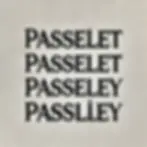The Origins and Evolution of the Name "Paisley"
- Gavin Divers
- Feb 27, 2025
- 3 min read
Paisley is one of Scotland’s most recognisable place names, yet its origins remain somewhat uncertain. Over the centuries, the town has been recorded under various spellings, evolving into the form we know today. Tracing its linguistic history provides insight into Paisley’s
ancient roots and the cultural influences that have shaped it.

Early Spellings and Variations
The earliest written records of Paisley, found in medieval charters, spell the name in several different ways, including Passelet, Paslet, and Paseleth. Over time, the final ‘t’ disappeared, leading to variations such as Paseley, Pasly, and Paslie, before eventually settling on Paisley.
This variation in spelling was common in medieval times when standardised spelling did not exist, and names were often written phonetically. The shifts in pronunciation and orthography reflect the linguistic changes taking place in Scotland over the centuries.
Possible Meanings and Origins
Scholars have debated the etymology of Paisley, and while there is no definitive answer, several theories exist:
Derived from a Brittonic or Gaelic Root
Some believe Paisley has Celtic origins, possibly coming from a Brittonic or Gaelic word. One suggestion is that it derives from the Brittonic Passelec, meaning "basilica" or "major church," which aligns with Paisley’s strong religious connections, particularly with its Abbey.
Linked to Early Christian Settlements
Another theory suggests the name could be tied to Saint Mirin, the Christian missionary who preached in Paisley and established a church there. If Paisley indeed derives from a word meaning “place of the church,” it would reflect the town’s deep religious heritage.
Old English or Norse Influence
Some researchers speculate that Paisley may have roots in Old English or Norse, with connections to words meaning “pasture” or “clearing in the forest.” Given that early settlements often formed around natural landmarks and resources, this explanation is also plausible.
Similar Words and Linguistic Relatives
The name Paisley shares similarities with several words from different languages, which might indicate its origin:
Brittonic and Gaelic Comparisons
Passelec / Baselique – A Brittonic or Old French word meaning "major church" or "basilica."
Pasge / Pash – Possible early Celtic and Brittonic words related to passage, crossing, or pathway.
Pasture / Pais / Pas – Words relating to open land or enclosures, possibly linked to early agriculture.
Old English and Norse Comparisons
Pasla / Paslow / Paslea – Anglo-Saxon names with pas or lea (meaning meadow, clearing, or woodland settlement).
Pays / Paysel – Old French words relating to country or region, which may have influenced Norman settlers.
Scots and Gaelic Variations
Baisle / Basla – Potential Gaelic forms resembling Paisley, linked to early settlements or land divisions.
Paslag / Pàislig – Scots Gaelic attempts at rendering Paisley, potentially influenced by Latin or Old French.
The Name’s Enduring Legacy
Regardless of its exact origins, Paisley has remained remarkably consistent in pronunciation over time, despite its shifting spellings. It has become famous not only as the name of the town but also for the globally recognised Paisley pattern, which originated from the textile industry that flourished in the 18th and 19th centuries.
Paisley’s name, with its rich historical and linguistic roots, continues to be a source of fascination. Whether tied to its religious past, geographic features, or Celtic influences, the town’s name stands as a testament to Scotland’s diverse cultural heritage.
